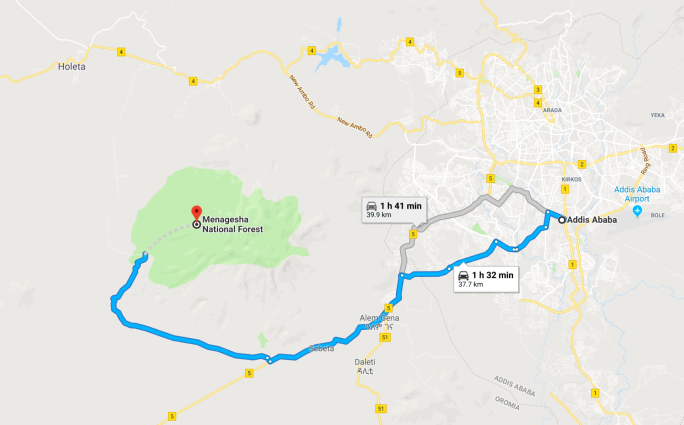1 day trip: Menagesha National Forest
The intention of this post is to guide you through your trip to Suba Menagesha, the oldest forest in Africa (at least that’s what they say at the entrance! Who knows?!)
Menagesha National Forest is a vast extension of green area, 40 km or one and a half hour away from Addis (depending on traffic), that offers a beautiful scape from the noisy capital and where, if lucky, you can enjoy many things at once: waterfalls, ancient trees, camping, sight of birds and other animals, a small exhibition center, hiking, among others. For me it was a good discovery and I plan to come back with more time during the rainy season, when I’m sure it will be even greener.
There are 2 ways to arrive to the forest: through Holeta (Ambo Road) or Sebeta (Jimma Road). We tried both to see which one is better and I recommend the second one, which, even being 2km longer, has a better road (both are unasphalted) and more life. Whatever way you choose, make sure to ask around once you reach the main towns (Sebeta or Holeta) not to miss the exit to the rural road that will lead you to the park.

If you have the money and lack the time, a 4×4 or minibus is advisable, as you can reach relatively fast (1-2 hours, depending on the traffic). In this case, none of the roads will make a difference as you will have a pretty good car to go through. Once reaching there, pay your fees and access the park.
Foreigners: 100 ETB / Residents: 50 ETB / Ethiopians: 40 ETB / Children: 20 ETB / Parking: 20 ETB / Guide: 100 ETB per hour / cameras: 50 ETB
If you don’t have a car, the way to go will be: from Torhailoch (Addis) to Sebeta by minibus (10 ETB). Then you go by Bajaj to Meta Abo (10etb); finally you can go by a horse car (15-30 ETB per person), but make sure to set the price before, specially for the horse ride as they can trick you and try to charge you more at the end of the trip. Calculate 3 hours in total.
The basecamp is a sweet but old facility (a bit dusty and abandoned) that contains many buildings: the ticket office, a small restaurant with board games and satellite TV, guards towers, dorms and guest houses, campfire and picnic area, and a nice, welcoming people who speak Afan Oromo, Amharic and a bit of English. The downside is that the power has not yet arrived to the place so they rely on a generator that they switch on only at nights; the mobile network is bad (I would say non existent) so don’t expect to make calls or use internet while there.
An old rusty map at the entrance will guide you through your possibilities: you can follow the tree trail (some trees are said to be more than 500 years old!), the foot path, check on the old railway, the waterfall (only during the rainy season) or you can drive in a bit deeper into the forest (after paying your fees) and do the hike. The attractions range from bird watching (according to the locals, more than 200 species, including yellow-fronted parrot, Abyssinian catbird, black-winged lovebird and banded barbet), to sights of other animals (colobus monkey, baboons, warthogs, bush baby, deers, honey badgers and leopards), hiking to Mount Wechecha (an extinct volcano that rises to 3385m), visiting the exhibition center, and walk, specially walk on the forest.

For our small group of five (including 2 kids), after the hassle of getting there (we did not have a car and it took us more than 3 hours to get there), it tasted like a piece of cake that we could not completely enjoy; therefore, next time we will definitely spend more days there. The good news is that you can camp yourself or you can spend the night at the guest houses, which basically are old, dusty but cozy villas within the park (furnished, kitchen and fridge included, in case you want to bring your own food). Make sure to close the windows and doors, otherwise the baboons will make sure that your dinner is gone!
For those wanting to spend the night there, the rooms fees go from 40 ETB per child till 100 per adult, with some prices in between depending on the facility where you want to spend the night. Don’t forget to request to light up the campfire at night, order your food in advance if you are going to use the small restaurant (don’t expect a big menu), and bring you towel and hygiene bag with you for you trip.
In case of questions or wanting to hire a guide, feel free to call Belay (who works at the camp) at +251-941614303. However, as the network is very poor there and he might not be reachable, feel free to call also Ashenafi Habte, a guide who speaks 3 languages (Amharic, Afan Oromo and English) and will guide you from Addis: +251-942558857.
Finally, breathe the clean air and the breeze that you can’t get in Addis!
Enjoy your trip!
